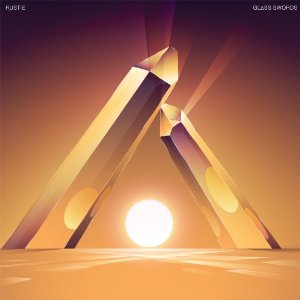There was a point in 2007 when it seemed that blogs, Myspace and YouTube had finally toppled the old music economy and established the (instant, archival) system we move within now. Everything was catalogued, every style revived, every hidden treasure common currency; we’d officially heard it all. How could a musician escape from the luxury trap? Faced with forbidding plenitude, they could only pastiche the already-pastiched, mix every colour together to produce a murky mess, or retreat into a tasteful cul-de-sac in search of breathing space. Or so some of us thought, immobilised by bloated hard drives like survivors of the rationing era who’d gorged on too many free bananas.
Rustie, meanwhile, simply dived in. For better and worse he was identified with this zeitgeist of too-muchness from his debut E.P. onward, and understandably so. On Jagz The Smack alone he pimped out dubstep with the digital onrush of Model 500, distorted hip hop to make it bounce harder, threw Neptunes ultraminimalism and synth funk into British bass music. And on each subsequent track, collaboration, mix and remix (or resmak, in his idiom) He came through with a new, tantalisingly uncontainable configuration. There’s nothing remarkable about eclecticism, of course, but what set Rustie apart from his more scattershot contemporaries (HudMo, FlyLo) was the sense that he navigated by qualities rather than formal characteristics. Specifically, the funk. More particularly, black sonic fictions (as explored by Kodwo Eshun) from grime back through techno all the way to Parliament-Funkadelic. With easy access to localised beat strains from across the globe (hyphy, crunk) as well as this rich heritage, naïve purism was never an option. But while his tracks are undeniably busy, their energy derives from a kind of megaton minimalism: each one blows up or accelerates a few simple elements and sets them in motion deep in space.
If Rustie’s talent was always obvious, where he was heading with it was not. The bracing bitstream sublime of last year’s Sunburst E.P. suggested he could end up lost in the funhouse, a producer’s producer – so it’s a pleasant surprise to find him debuting with the best dance album of 2011. Glass Swords is a hook-laden, 40-minute monster that’s itching to take on the big room crowd. Pinning down the sound is tricky – most tracks juggle three-plus great ideas and echo as many styles again – but broadly speaking, UK bass music provides the, er, base, while the sound palette combines the vanguard with the vulgar. And the latter’s where we come in: an intro comprising trance-y arpeggios, simulated soft rock guitar lines and hoover bass, after which ‘Flash Back’ bounces 80s electrofunk into hyperspace. Nimble and weighty in just the right measure, its up-up-up freshness and sheer scale set the tone for what’s to follow. So does the subtle dislocation of apparently familiar sounds. Here and on ‘Hover Traps’ vintage moments when instruments shed their physical skin – the guitar/synth hybrid of Van Halen’s ‘Why Can’t This Be Love’, the slap/synth bass of mid-80s soul, the jumping drum machine tom of early electro – are rendered still less real by the limitations of the blocky technology Rustie applies. And in the tradition of everyone from Prince to Wiley, this, in tandem with bold (re)arrangements, gives them an exotic new life. The same tendency lends a peculiar lustre to mighty dubstep workouts like ‘City Star’ and ‘Death Mountain’, whose tremulous video game tones and devastating basslines have a rare, warm beauty.
Rustie’s neatest trick is to use contemporary pop’s weight against itself, like an aikido master. Autotuned and pitch-shifted vocals are rerouted back into a polymorphously perverse world familiar from Timbaland’s R’n’B productions. (‘Cry Flames’, a gorgeous slow stomp of a ballad whose rococo keyboard runs and vocal tweets stand in for melisma and backing singers, could easily have begun life as a resmak of Timbaland/Timberlake’s ‘Cry Me A River’.) ‘Ultra Thizz’ even takes on Guetta and his millionaire droogs. On the surface it’s all peak: cajoling clap rolls and bullying bass. But look down and you’ll notice agile beats sweeping your feet into motion, and a dreamy romance in the robot-voice bassline – the grace of Ali dancing around the mummy Foreman. The upfulness is upped still more on ‘All Nite’, a monolithic anthem in the spirit of Daft Punk’s ‘One More Time’; its simple hooks manage to recall 80s funk, 90s R&B and 00s speed garage and dubstep at once. Surprisingly, Daft Punk’s Discovery is a reference point throghout, with its
similar knack for looping highs to produce uncanny über-pop. The asteroid-shower synths and jangling loops of Rustie’s ‘Globes’ make it the purest example.
With such keen melodic sense, rhythmic knack and timbral identity, it does feel as if – with the right singer – Rustie could lively up UK pop with his synthesis of the bits it’s missing. On the other hand, Glass Swords shows that his aesthetic is developed enough to carry an album in its own right. Even the airbrush cover art and quasi-synaesthetic titles (‘Glass Swords’, ‘Cry Flames’, ‘Crystal Echo’) work together: what better way to capture effervescence overload in virtual/outer space than ‘Ultra Thizz’, with its hints of fizzing sci-fi cocktails and druggy luminosity? There’s a unique logic to Glass Swords that’s easy to miss on a first listen. Although initially the most jarring track, ‘Surph’ turns out to be the best realised: a three-minute world containing elements of everything else on the album. I found hooks I hadn’t noticed while playing it worming through my head days later, and there’s no better testimonial to Rustie’s managed moreness than that.


